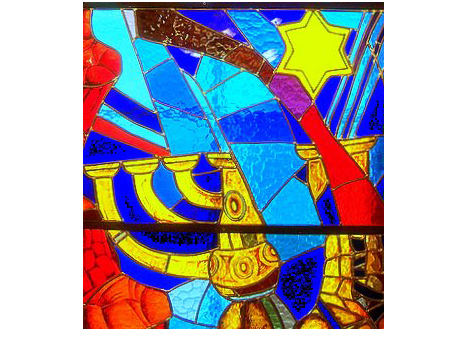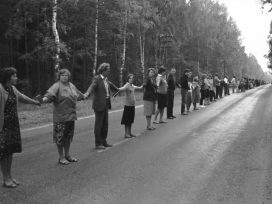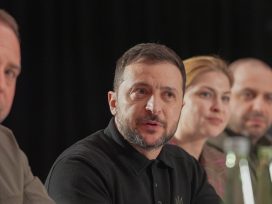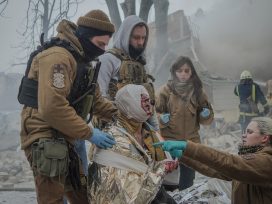The Jews and the Maidan
It has almost become a commonplace that Ukrainian nationalism is anti-Semitic by nature. Vitaliy Portnikov refutes this stereotype by showing that both Jews and Ukrainans were under Russian dominance and thus not at home in their country. The Maidan has finally provided a chance to build a modern political nation where Jews can be Ukrainians.
From its beginning, the movement of Ukrainian citizens against an oppressive regime has been denounced as dominated by anti-Semitic forces. Neither the presence of the Jewish movement’s leaders and rabbis on Maidan’s stage, nor the guarding of Kyiv synagogues organized by Maidan’s self-defense security forces, nor the existence of “the Jewish hundred”, nor the death of Ukrainian citizens of Jewish descent during the crackdown on protesters, nor international support from Jewish organizations could stop the staccato of Russian propaganda being willingly echoed in the West.

A stained glass window in the Great Choral Synagogue of Kyiv, also known as the Podil Synagogue. Photo: Kazimierz222. Source:Wikimedia
This will not stop: it is part of the Kremlin’s strategy to discredit the Ukrainian revolution, delegitimize the new government and destabilize the country.
Instead of repeating the obvious once again I want to ask what the place of Jews in Ukrainian history has been, and how it has changed since the Maidan revolution. Against all allegations of anti-Semitism and xenophobic nationalism this event marks the birth of a political nation that finally allows the Jews, as all other Ukrainian citizens, to choose and live their identity.
This Ukrainian political nation will not have inner ethnic boundaries, in the same sense, for example, that the French political nation does not have them. French Jews – despite all anti-Semitic incidents in the past – have long felt a part of the political nation precisely because ethnic boundaries have been erased, and everyone who wants to feel French, to remain a Jew, or to combine both identities has the free choice to do so.
But when there is no political nation, there is no free choice. This used to be the situation in Ukraine. Before the collapse of the Soviet Union, both Ukrainians and Jews were considered part of a kind of a “super-ethnos”: the “Soviet people,” sub-divided into republics, like apartments in a building, and into ethnic groups. At the same time, the idea of “the Soviet people” masked the de facto dominance of Russian culture. Ukrainians still had the option of either accepting Russification and abandoning their national identity in order to achieve social success, or preserving their ethnic identity. However, the costs could be high, as insisting on one’s Ukrainian identity was considered to be close to Ukrainian nationalism. Jews had no such choice at all.
Ukrainian Jews are an interesting phenomenon among Jewish communities in eastern and central Europe because there has not been such a thing as a Ukrainian Jew for a long time. Not that they had never existed at all – they had, of course – but they had fallen victim to the seventeenth-century Bohdan Khmelnytsky uprising, which led to the almost total extermination of the Jewish ethnicity in Ukrainian lands. The next stage of Jewish settlement began after these lands, and then the remaining territories of the Polish-Lithuanian Commonwealth, were annexed by the Russian Empire. Thus, Jews arrived in a land where everything Ukrainian had already been eradicated, not only by the colonial administration, but also with the help of some Ukrainians who preferred a career to the interests of their ethnic group. The new Ukrainian Jews, for their part, could be divided into two groups. The first group strove to become a part of “the new world”, whether the Russian imperial or the Soviet one, through totally renouncing their ethnic roots, which meant a direct ticket to becoming Russian/Soviet. The second group aimed to preserve their identity while participating in the life of the state. But this state was never a Ukrainian one; the dominant culture was always Russian, whatever disguise it tried to put on. Some Ukrainians were ready to perceive this disguise of a “Ukrainian Soviet Socialist Republic” as a real thing, because in this way it was easier to cope with the fact that they were a subjugated people. But this disguise was always obvious for Jews. Thus, like many of their neighbours, they became Russian-speakers, even if in the past their native language had been Yiddish and their neighbours had spoken Ukrainian.
One should also not forget that this second group of Jews – those who didn’t want to sever ties with their identity – were consistently subject to attacks by the Russian and later Soviet authorities. The Zionist movement in the Russian Empire and the Bund party, which had aimed for national autonomy, were destroyed by the Bolsheviks. Next in line was Yiddish-language culture. Repressions started in the 1930s, and in the last years of Stalin’s life, when the classical authors of Jewish literature had already been executed and the great actor Solomon Mikhoels had been killed, Jewish culture was almost totally uprooted. This was also the time when groups of ethnic Jews in Ukraine, who had remained almost untouched by Russification, practically ceased to exist: the Jews of Galicia and Bukovyna who actively interacted with Ukrainians, Poles, and Romanians, were exterminated in the Holocaust. The Holocaust also destroyed another peculiar Jewish ethnic group that had not been subjected to Russification – the Krymchaks who had lived alongside Crimean Tatars. Thus, by the mid-1950s, the Jews of Ukraine were nothing more than “Soviet people”.
The fear of being themselves stayed with Ukrainian – or rather, Soviet – Jews until the very last day of the Soviet Union’s existence. A natural response to that fear was assimilation to the Russian culture, repatriation to Israel, or emigration to the United States. Joining the Ukrainian national movement, which was persecuted and marginalized by the authorities, was not an option.
What changed after the proclamation of Ukraine’s independence? Basically nothing, because this independence proved to be little more than a renaming of Soviet Ukraine. Of course, dependence on Russia weakened, but Russian cultural influence remained dominant. And the main thing – the development of Ukraine as a state – continued to be determined by a Soviet civilization that perceived everything Ukrainian to be second-rate and relegated it to the domain of folklore. The high tide of this perception, however paradoxical this might seem, occurred just after 2004, when Viktor Yushchenko, the king of Ukrainian political folklore, came to power. Ukrainians tried to defend their national culture marginalized in their own country. This “ethnic revolution” gave rise to the appearance of nationalistic and national-radical political groups. It also deepened the rift between the west and centre of Ukraine on one side and the east and south on the other, that is into territories where the “ethnic revolution” triumphed and the territories where the Soviet civilization in its most coarse, kitsch-like forms ruled uncontested.
What were Jews to do in this confrontation? Not much. There was no longer any influential Jewish community in the country. Since the early 1990s, the majority of citizens of Jewish descent who had lived in the Ukrainian SSR had become citizens of Israel, the United States or Germany. Those who stayed were, as they had been in imperial times, assimilated. Thus, Jews living in the western and central regions typically accepted the revival of Ukrainian culture, even if in its narrow ethnic version, while most Jews of the east and south were still the same Soviet people unswervingly convinced of their connection to Russian culture and this culture’s superiority over all others. While the President of the Eurasian Jewish Congress, Joseph Zissels, as well as the author of these lines, appeared on Maidan’s stage, in Kharkiv, local authorities Mikhail Dobkin and Gennadiy Kernes, both of Jewish descent, became symbols of neo-Soviet chauvinism in its most hooligan form.
The protest movement put an end to this marginal existence. It became an overture to the establishment of a new political nation. Suddenly, everything in Ukraine was common to everyone and for everyone – the flag, the anthem, values and even the slogan “Glory to Ukraine!” Suddenly, one could address people of different ethnicities as Ukrainians. Suddenly, it turned out that not only ethnic Ukrainians but also Russians, Jews, Armenians, Belarusians, Azerbaijanis and Crimean Tatars were ready to sacrifice themselves for the country. Yes, this process was less articulate along the eastern border, but now, in the face of the Russian aggression, it is gaining momentum in Ukraine’s eastern regions, too. And unless they fall prey to Russian occupation, the modern Ukrainian political nation will take shape there as well.
This means one simple thing – Ukrainian Jews across the country will become a natural part of the new political nation, just like Ukrainian citizens of any other ethnicity. Xenophobia and anti-Semitism will be irrevocably relegated to the margins of social life and will survive only in the Kremlin’s propaganda.
It is this formation of a modern political nation that troubles Putin’s regime most. Ukraine had remained a Russian colony not because it was paying for natural gas, and not even because its fourth president was a Kremlin-controlled puppet. It had remained a Russian colony because the Soviet mentality of Ukrainians correlated with the Soviet mentality of Russians, who turned out to be tragically incapable of accepting modernity. The collapse of this Soviet mentality in Ukraine marks the end of an occupation that began with the 1654 Treaty of Pereyaslav, it marks a break with the past and a move toward the future. This is something that the Russian political elite, Soviet to its core and staggeringly provincial, is unable to comprehend. It perceives this process of establishing a new political nation in Ukraine as a triumph of an “ethnic revolution” and does not notice that the Maidan revolution is political and has opened Ukraine’s way to modernity.
Published 26 March 2014
Original in Ukrainian
Translated by
Myroslava Luzina
First published by Eurozine (English version); this is an edited version of an article commissioned by the Ukrainian Jewish Encounter
Contributed by Transit © Vitaliy Portnikov / Eurozine
PDF/PRINTNewsletter
Subscribe to know what’s worth thinking about.
Related Articles

The fall of the Berlin Wall, and not the human chain across the Baltics, is emblematic of 1989. But what if this show of unity had become iconic of communism’s disintegration? Could acknowledging Eastern Europe’s liberation positively reframe what Russia otherwise perceives as loss since the Soviet Union’s demise?

The ‘Trump–Putin deal’ again places Ukrainians in a subaltern role. The leaked contract with its fantasy $500 billion ‘payback’ has been compared to Versailles, but the US betrayal recalls nothing so much as Molotov–Ribbentrop.





